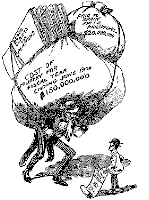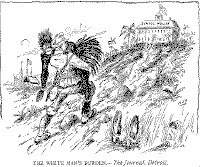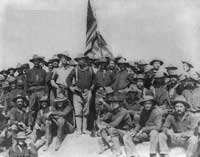|
| |

History of Imperialism in Cuba
(click one of the historical landmarks of Havana to see an enlarged
view)

Centuries
of Conflict
Cuba's history is filled with conflict against imperial beliefs and
powers. Since it was discovered by Europeans until the eve of the 20th century it
was held as a Spanish Colony. The Spanish-American War and it's aftermath brought
new conflict for Cuba and a new world power to deal with. To understand the current
situation in Cuba it is vital to understand past events in Cuban history.
Cuba's relations with Spain started early, with the arrival of Columbus
on their shores. At this time neither Columbus nor the Spanish government were
concerned with the welfare of the Taino and Ciboney people indigenous to the region.
Columbus' first concerns were for gold and slaves, as illustrated in his journal,
"Let us in the name of the Holy Trinity go on sending all the slaves that can be
sold." (Zinn, 4)
After Diego Velasquez conquered the Cuban island for Spain in 1511 the
Taino and Ciboney were also used to work in the field producing sugarcane. The
Spanish who had control over Cuba at the time had little concern for the welfare of their
subjects. The indigenous population was decimated by hard work in fields and mines,
disease and insurrections. Spain's policy in Cuba led to almost complete genocide of
the native population. Native Africans brought into Cuba as slaves helped to replace
this lost labor force.
Spanish Colonial Rule
Spanish rule in Cuba was incessantly tested for decades before America
became involved in the struggle for Cuban independence. From 1868 to 1878 a revolt
was led by Carlos Manuel de Cespedes, a sugarcane plantation owner. This revolt,
known as the Ten Years War, ended the lives of 200,000 Cubans. In 1895 another
revolt surfaced under the cry of "Cuba Libre!" (Free Cuba!). Jose Julian
Marti, a Cuban poet and patriot, led the struggle for independence until he died in
battle.
The Cuban rebellion against Spanish rule came at a time of widely
different views in America. There were three primary schools of thought in regards
to foreign affairs. One claimed imperialism as America's right. This was
often supported by a humanitarian rationale, many thought that it was the "White
Man's Burden" to guide and rule the Cuban people, who were seen as incapable of
self-rule. Another point of view was intensely anti-imperialistic. This
viewpoint was also supported by a humanitarian rationale. Many sympathies were
aroused by Spanish cruelties.
Some also saw the Cuban rebellion akin to the American Revolution and
were willing to support Cuban independence from an oppressive power. Often these two
viewpoints are the only ones considered, despite the importance of another group.
This group, as described by William Appleman Williams in The Tragedy of American
Diplomacy, was
a coalition of businessmen, intellectuals, and politicians who opposed traditional
colonialism and advocated instead a policy of an open door through which America's
preponderant economic strength would enter and dominate all underdeveloped areas of the
world. (Zinn, 294)
The Spanish American War
Prior to the war many big business interests were against supporting a
military engagement because they feared that a recession would result. However, it
became apparent to many that the door to Cuba would not open without American involvement
in the War. U.S. troops became involved in the fighting after the Maine, a United
States battleship, exploded in February of 1898. Many speculated that the explosion
was wrought by Spain and that media hysteria soon led to war.
Imperialism and colonialism may not have been strong motivations for the
war effort. Before the advent of war economic neo-colonialism was the dominant
concern, McKinley had even forsworn more direct control by promising to prevent the
annexation of Cuba. However, the war itself did much to inflate expansionist
beliefs. It was the most popular of all American wars and the relatively low cost of
maintaining the war (which lasted only a short while) convinced many that colonialism and
imperialism would have little cost. Theodore Roosevelt was the quintessential
imperialist during the war. He led a volunteer army (the Rough Riders) to capture
San Juan hill and referred to the Spanish-American War as a "bully fight" and as
"great fun." Commercial and industrial interest was increasingly
converted to expansionism as business sought cheap raw materials and new markets for their
goods. The concept of the "White Man's Burden" also took a greater hold as
Americans realized that this "humanitarian" concept supported their desire for
further expansion, making neo-colonialism an "imperialism of righteousness."
United States Influence
While the United States had previously sworn off annexation of Cuba, the
dominant neo-colonial opinion was still far too strong to deny. U.S. business
demanded economic presence and influence in the Cuban economy. Since there was a
strong chance that complete Cuban sovereignty would exclude this neo-colonial influence,
many Americans demanded an influence more direct than economic superiority could provide.
This desire took hold in the Platt Amendment in 1901. While it ended the war
and increased the power and sovereignty of Cuba it also limited Cuba in many ways,
restricting ability to make treaties, borrow money and change laws. The United
States also reserved the right to maintain a military presence (in the form of a naval
base) and to intervene in Cuban affairs. While this peace largely ignored the Cuban
desire for freedom the Cubans had little choice since the treaty was negotiated between
Spain and the United States. The Cuban island had changed its status from Spanish
colony to sovereign nation, a step forward despite conditional and incomplete self-rule.
The Spanish-American War and U.S. involvement in Cuba, exemplified in the
Platt Amendment, arose largely from humanitarian interests and economic conditions.
The results were Cuba being left without complete independence and the continuance of
American presence in Cuba. The U.S. federal government still maintained political,
economic and military influence over Cuban affairs.

Links to more information:

This page created by students
Elizabeth Allen / Peter Eames / Tony Suber
  
|
Key Terms


Uncle Sam: I Don't Like the Job,
Rudyard, My Boy!

The White Man's Burden
By Rudyard Kipling
McClure's Magazine 12 (Feb. 1899).
Take up the White Man's burden--
Send forth the best ye breed--
Go, bind your sons to exile
To serve your captives' need;
To wait, in heavy harness,
On fluttered folk and wild--
Your new-caught sullen peoples,
Half devil and half child.
Take up the White Man's burden--
In patience to abide,
To veil the threat of terror
And check the show of pride;
By open speech and simple,
An hundred times made plain,
To seek another's profit
And work another's gain.


The White Man's Burden
|
The Brown Man's Burden
by Henry Labouchère
Truth (London); reprinted in Literary Digest 18 (Feb. 25,
1899).
Pile on the brown man's burden
To gratify your greed;
Go, clear away the "niggers"
Who progress would impede;
Be very stern, for truly
'Tis useless to be mild
With new-caught, sullen peoples,
Half devil and half child.
Pile on the brown man's burden;
And, if ye rouse his hate,
Meet his old-fashioned reasons
With Maxims up to date.
With shells and dumdum bullets
A hundred times made plain
The brown man's loss must ever
Imply the white man's gain.
Pile on the brown man's burden,
compel him to be free;
Let all your manifestoes
Reek with philanthropy.
And if with heathen folly
He dares your will dispute,
Then, in the name of freedom,
Don't hesitate to shoot.


Teddy Roosevelt and the Rough Riders

Bibliography
Zinn, Howard. A People's History of the United States. New
York: HarperCollins, 1980
Hofstadter, Richard. The American Political Tradition.
New York: Random House, 1948
|

|